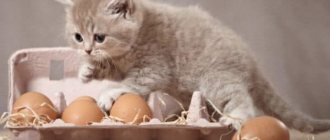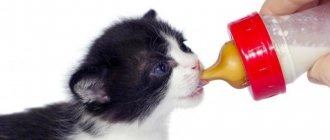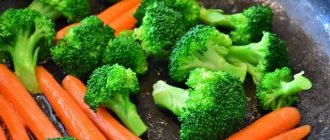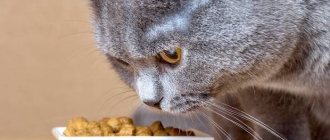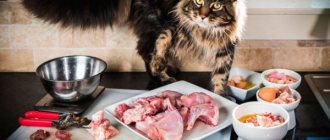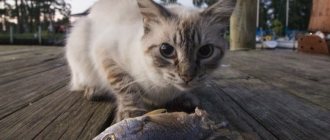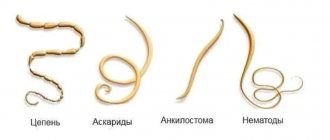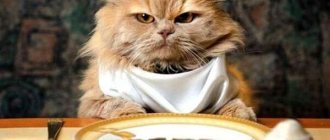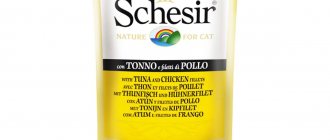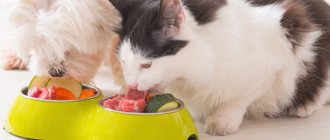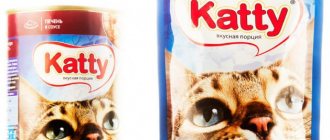Most cat owners do not know what not to feed their pet. Veterinarians believe that mixed food is not suitable - you need to choose either natural food or high-quality food (our food rating).
However, as the practice of many volunteers and animal owners shows, mixed nutrition is acceptable. What then cannot be fed to cats, and what can be given? Many cats eat a mixed diet and feel good - it's all a matter of habit. Let's try to figure it all out.
List of not recommended products
Products that are not recommended fall into the category of “possible, but not recommended.” Let's weigh the pros and cons.
Not recommended products:
Milk
Little kittens drink their mother's milk; it contains everything they need for their health and development. With age, lactose is less absorbed by the body - even with a small dose of cow's or goat's milk, a cat may develop diarrhea.
But if the cat does not experience vomiting or diarrhea, milk can be given in small quantities (fat content 2.5% and no more than 10 ml per 1 kg of body).
Canned food
You can give it to your cat, but in small portions, mixing it with oatmeal porridge, for example. Before presenting the animal with a treat, it is advisable to drain the oil from the jar.
Sausages
The opinions of cat owners on sausages are divided: some believe that sausages are unacceptable, while others pamper their pets with delicious sausages and sausages. If the sausage is raw and without lard, you can safely feed it to your cat.
The best thing an owner who loves his pet can do is monitor his reaction to food. Each animal is suitable for different food - what is best absorbed by the body should be given.
Raw meat
Cats are carnivorous animals and they need raw meat, but not all types are suitable. Veterinarians advise avoiding pork and other fatty varieties for feeding: duck and goose, since even a small portion of fatty meat leads to obesity.
Bread products
Pasta, bread and yeast dough. Yeast, entering the body, swells and stretches the animal’s stomach, which causes severe pain. Pasta and baked goods lead to flatulence and colic. But a small piece of whole grain bread won't lead to trouble.
Liver
This product contains toxic amounts of vitamin A, causing poisoning. Raw liver can be contaminated with bacteria (the same goes for raw fish). It would not be surprising if your cat develops diarrhea or a fever after eating. If a cat loves liver, it must be thermally treated.
Eggs
This product is rich in calcium, and its deficiency is dangerous for growing kittens. Sometimes eggs are dangerous for a kitten; it is best to give your baby homemade eggs.
Veterinarians agree that an adult cat can only benefit from quail and chicken eggs, but they should be given to the animal in moderation. Some cats are allergic to protein.
Apples
There will be no harm from the apples; on the contrary, the urine will be acidified and stones will not form. If your cat likes to chew on apples, let him, but you should remove the seeds. You can also give it in small quantities.
Potato
You can give your pet a small piece of boiled potato as a treat, but the product should not be used as part of the diet.
Avocado
Cats may be interested in avocado because it smells like boiled chicken. Avocado is allowed, but in moderate doses (optimal serving: 2 teaspoons).
Expert opinion
Dusheba Vera Ivanovna
In 2010, she graduated from the Moscow State Academy of Veterinary Medicine named after K.I. Scriabin with honors, specializing in veterinary medicine. I regularly attend veterinary conferences, congresses, and webinars.
If the cat initially ate meat, it should continue to be fed. If an animal eats dry food, meat should be a rare guest in the bowl and with additives. Meat is phosphorus, it must be balanced with calcium, otherwise problems with bones will appear. For 100 g of meat you will need 1 tablet of calcide.
What to do to prevent your cat from eating junk food
Your cat's health directly depends on what you feed it. A balanced diet, adherence to a diet and keeping harmful foods out of the reach of your pet are the key to your pet’s health and longevity.
Follow our simple tips and your pet will never eat anything dangerous:
- Don't feed your cats table scraps. Stop children from doing this.
- Don't be tempted to give your pet something tasty. Cats should eat their own food and special cat treats.
- Do not allow cats to sit near the cutting table while preparing food - you may not be able to keep an eye on your pet, or he will steal a dangerous piece.
- Be especially attentive to your cat during holiday feasts. Make sure your pet doesn't accidentally eat something unwanted. Prohibit guests from giving your pet treats.
- Keep food out of your cat's reach. In the case of kittens and overly inquisitive pets, it may be necessary to install locks on food cabinets.
- Keep your cat away from the trash can.
If you suspect your cat has eaten something unwanted, take her to the vet immediately.
Prohibited Products
All owners who care about the health of their pet should remember the list of things that cats should absolutely not be fed.
Prohibited products:
Onion
Categorically not suitable for cats, this also includes garlic, shallots and leeks. The products contain harmful substances - disulfides. Poisons accumulate in the animal's body, resulting in poisoning.
Chocolate
Sweet chocolate is a favorite treat for many, but it is dangerous for cats. Even a piece of chocolate can be fatal. This also includes other sweets: candies, nuts, dried fruits, raisins, grapes, etc.
Alcohol
Drinking alcohol is fun for many people, but not for cats. By poisoning the liver and brain of an animal, alcohol can be fatal. Drinks containing caffeine are also contraindicated: coffee, cocoa - the product causes palpitations in the animal, and cardiac arrest is possible in large doses.
Mushrooms
The product is not a natural food for a predator. Mushrooms are very filling and comparable to meat products, but they are a difficult to digest product.
It is unlikely that anyone would think of feeding their pet dog food, but it is also on the list of prohibited foods. You should not injure your cat's stomach with bones from poultry or meat.
Meat and fish
By nature, cats are carnivores, and meat is their natural food. However, not all meat can be given to your pet:
- Raw meat and fish. It is better to avoid unprocessed meat due to the risk of infecting your cat with worms;
- Offal. Trimmings and intestines are prohibited: feed your cat clean meat. But hearts, kidneys and stomachs are useful, and they should even be given as food;
- Liver. Such food is difficult for the animal to digest. Can be given in small quantities and only boiled;
- River fish. It is dangerous because it contains parasites and provokes urolithiasis.
The opinion that fish is a cat’s favorite food is wrong: in nature, whiskered cats do not fish. Fish is not a natural food for cats, so give it rarely, preferring sea fish. It is recommended to avoid pork: it is a very fatty meat for your pet.
What not to feed a small kitten
At 4-5 weeks, the kitten develops a constant food intake pattern. At this point, babies are fed 4 to 7 times a day. Starting from the 12th week, feeding is reduced. During the growing period, it is important not to spoil the kitten’s stomach and provide its body with all the necessary beneficial elements.
The menu of a small kitten should not include the following products:
- purchased sausages;
- freshwater fish;
- pickles;
- cow's milk (goat's milk is a good substitute);
- potato;
- cheese;
- legumes;
- lamb, pork;
- sweets;
- bakery products.
The owner should always monitor the water bowl for a cat of any age, and periodically add water. Lack of fluid when eating dry food leads to urolithiasis.
Many owners cannot resist - they just want to pamper the new family member with a delicious sausage from the human table or salted fish. But now you know what not to feed cats and small kittens. Food intended for humans contains a lot of spices and additives, and feeding them with this will not lead to anything good. Dry food for kittens is acceptable, but only high-quality and consumer-tested. In this article, consider what to feed your kitten.
Industrial food and natural food can be combined only during the period of accustoming the kitten to food or natural food. In the future, the animal should be on one feeding option. Regular combination will lead to an imbalance of vitamins in the body, which will negatively affect the functioning of the entire body.
The importance of proper diet
Due to the nature of their keeping, domestic animals are quite demanding on their diet. Their diet must be balanced to meet the body's nutritional needs. It is especially important that your kitten and aging pet receive a balanced diet, otherwise they may develop health problems. An adult cat should also have a special diet.
When compiling a diet, you need to rely on the following points:
- breed. Each variety has its own food requirements;
- age. At a certain period of its life, an animal needs specific nutrients that are necessary for proper growth and development, as well as maintaining health;
- Finished products (dry and wet food) or natural products are used.
The easiest way to feed your pets is dry food (especially super-premium food). If the animal is offered natural products, it is necessary to alternate them correctly. Also in this case, it is important to know what food can be given and what is strictly prohibited.
Useful video
What not to feed cats and kittens, advice from a veterinarian.
Get to know interesting cat breeds with the help of our encyclopedia: Havana Brown, Dwelf, Manx.
What to feed a kitten?
What grass do cats eat and why?
Vegetables and fruits
Vitamins from plant foods are also beneficial for cats. But some fruits and vegetables should not be given:
- Potato. Cats cannot digest starch, so potatoes are useless to them;
- Cabbage and legumes. Cause flatulence and bloating;
- Onion and garlic. They have a strong taste and contain substances that are toxic to animals;
- Mushrooms. Food too heavy to digest;
- Avocado. The fruit of this fruit is poisonous to cats;
- Nuts. Do not let your cat play with nuts: they are dangerous due to their high phosphorus content;
- Grapes and raisins. This fruit is poisonous to cats, as it is to dogs.
Cats do not digest fiber, but it is necessary to include vegetation in the menu. You can give carrots, cucumbers, zucchini, spinach, lettuce and boiled beets.
Stop menu for kittens
As a rule, kittens like to eat often. Therefore, their nutrition needs to be given special attention. The thing is that the kitten’s digestive organs are just in the process of formation. A balanced diet is a guarantee of his health and productive growth.
Since the kitten’s body has not yet formed, you should approach its nutrition with all seriousness.
Table 2. Products not recommended for use by kittens
| Product | Cause |
| Cow's milk | The fat content of this product is excessive for a kitten's stomach. If your pet wants milk, then it is better to buy goat milk or dry milk. It can usually be found in specialty stores. |
| Liver | It is not beneficial for the body, so it can not be included in the diet. In rare cases, it is allowed to give boiled liver. |
| Freshwater raw fish | Various parasites live in it, which the kitten’s body may not survive. |
| Sausage and smoked meat | The composition is not important; these products are harmful in any case. Fats and salts have a negative effect on the animal's body. |
| Potato | It doesn’t matter whether it’s digestible in boiled or raw form. Domestic kittens cannot digest it normally. |
| Bones | They easily injure the gastrointestinal tract, leading to further serious digestive problems. |
Sweets, baked goods, baked goods
Cookies, sweets, chocolate, buns and pasta are a source of huge amounts of carbohydrates. They cause obesity, diabetes, caries and other pathologies in cats. A cat gets its energy from proteins. It is able to utilize carbohydrates, but in small quantities.
In the wild, cats consume no more than 5%. In ready-made dry food this amount increases to 20-30%. But there, foods containing carbohydrates are processed so that they are quickly absorbed. Thus, the manufacturer reduces the price of feed by reducing the amount of meat. Therefore, cats develop diarrhea, increased gas formation and fluid retention when exposed to certain types of food. Unprocessed carbohydrates from sweets and baked goods increase the risk of developing pathologies.
Natural chocolate is especially dangerous for cats. Cocoa beans contain caffeine and theobromine, which have a stimulating effect on the nervous system. A small piece of dark chocolate or chocolate candy can cause a heart attack, short-term neurological disorder, severe thirst, convulsions, and excessive agitation in your pet.
